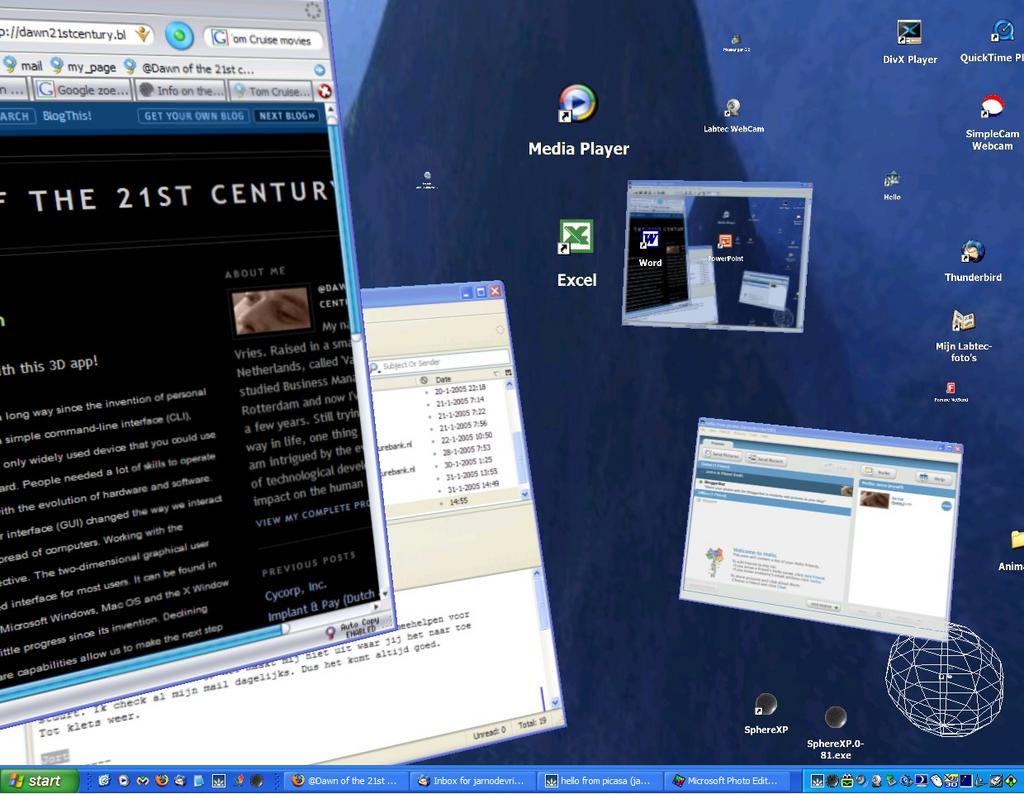In
Google Earth, there is this feature called 'layers'. One of the layers you can activate is the 3D-layer. When flying thru Houston for example (see picture below), you can then really see the buildings in 3D, although they still look like giant white boxes, I think it's still pretty darn cool! Anyway, since I live in Rotterdam, the Netherlands, I am obviously frustrated that the Rotterdam architecture hasn't been mapped out yet. But I guess that's just a matter of time. Wouldn't it be cool though if you could actually see what the buildings would like like, instead of white boxes? But I guess that's also just a matter of time. If you would then add a 'game-like layer' by means of which you could actually land on the ground in
Google Earth. You could then walk around (just like in the games) and 'enter shops' and so on in the virtual world. By accessing the physical location, you would then get access to the store's website or something.

The other way around, maybe they could develop this easy-to-use software-tool for the cell-phone. By pressing one button you could have 'your journey logged'. The log would contain both audio, video and location-based meta-information. The logfile would than be contained in a format compatable to
Google Earth. So back home you can enjoy a virtual flight thru the places you just actually visited, on your large screen TV.
Then imagine a world in which RFID-chips have reached the 2.5 - 5 cent price-level. So let's say, in 5 years, all products the consumer can buy anywhere will then be tagged. All portable devices will then also have an RFID-capability. Again, with a nice software-tool added to the mix, this way, a logfile can automatically be uploaded to your 'lifelog' on the web, containing information about what products you bought at what time in which stores, at what price etcetera etcetera. Since the RFID-chips contain information on the specific manufacturer of the product at hand, date of fabrication, contact-info, etcetera, all this info would also be contained in the logfile.
Combined with the
Google Earth - story this would mean that you would for instance go shopping on saturday. Then you come home, switch on the television, upload the
Google Earth compatable log-file from your cellphone or whatever mobile device and then on screen your taken on a virtual flight thru the streets that you just visited. Then you could 'stop the movie' at any time, fly around yourself simply because you can, enter the shop you just visited, but virtually this time, and then get access to the log-file of the products you just bought there.
With storage capacity growing, processing speed further increasing, manufacturing costs of chips decreasing, over time we will log a an-ever growing percentage of our daily lives. From whatever perspective you take. Whether it is the logging of 'meta-ìnformation' (what product was bought at what price), or actual info (audio/video/your own movements) or 'related information' (product and manufacturing information on RFID chips etcetera). And why would we store and log so much? because we can! Just look at the growth of weblogging. Does THAT make any sense? Most people just like myself do not really have anything very much substantial to say in their weblogs, yet every 5 months the number of weblogs is still doubling! It's in our nature to 'store information'.






0 Comments:
Een reactie posten
<< Home